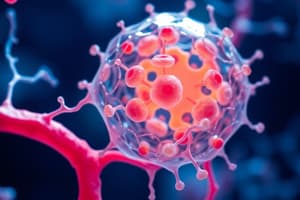Podcast
Questions and Answers
What is the main focus of cell biology?
What is the main focus of cell biology?
- Studying the structure and function of cells (correct)
- Manipulating cells for industrial purposes
- Investigating environmental factors affecting cells
- Exploring the mechanisms underlying disease only
Which organelle is responsible for energy production in a cell?
Which organelle is responsible for energy production in a cell?
- Mitochondria (correct)
- Golgi apparatus
- Chloroplast
- Endoplasmic reticulum
What is the function of lipids in a cell's structure?
What is the function of lipids in a cell's structure?
- Facilitate protein synthesis
- Provide energy for cellular processes
- Serve as the outer layer, providing structural integrity and insulation (correct)
- Regulate cell division
What component houses the genetic information of a cell?
What component houses the genetic information of a cell?
What is the process by which proteins are manufactured from amino acids according to DNA instructions called?
What is the process by which proteins are manufactured from amino acids according to DNA instructions called?
Why is cell biology significant?
Why is cell biology significant?
What is the main function of apoptosis in cell biology?
What is the main function of apoptosis in cell biology?
Which process leads to the duplication of an entire cell?
Which process leads to the duplication of an entire cell?
What is the primary goal of signal transduction in cell biology?
What is the primary goal of signal transduction in cell biology?
Which technological advancement has greatly enhanced precision in cellular research?
Which technological advancement has greatly enhanced precision in cellular research?
What is the process by which unspecialized cells acquire unique characteristics?
What is the process by which unspecialized cells acquire unique characteristics?
In cell biology, what is the overall purpose of understanding signaling pathways?
In cell biology, what is the overall purpose of understanding signaling pathways?
Study Notes
Overview of Cell Biology and Its Significance
Cell biology, at its core, is the study of cells—the fundamental units of life. It encompasses a wide range of disciplines, from understanding how cells function to exploring the mechanisms underlying disease. At the heart of modern biology, cell biology investigates the structure, behavior, and interactions of living components within and among cells.
The significance of cell biology lies in its ability to provide insights into the most basic building blocks of life. By studying cells, researchers can uncover clues about the origins of life, evolution, and the fundamentals of biological processes. Additionally, advances in cellular technology have allowed scientists to manipulate cells for therapeutic purposes, such as designing treatments for diseases or creating synthetic life forms.
Components of Cell Structure
At the nucleus, DNA (deoxyribonucleic acid) is housed, containing the genetic information of the cell. Proteins synthesized by RNA (ribonucleic acid) serve essential functions within the cell. Lipids comprise the outer layer, providing structural integrity and insulation. Organelles like chloroplasts, mitochondria, and endoplasmic reticula facilitate specialized tasks such as photosynthesis, energy production, and protein processing, respectively.
Key Processes in Cell Biology
Protein Synthesis: The process of manufacturing proteins from amino acids according to instructions encoded in DNA.
Metabolism: The sum of all chemical reactions occurring within the cell, including breakdown and construction of organic molecules.
Signal Transduction: Mechanisms by which cells receive and transmit signals across their surfaces, often initiating intracellular responses.
Apoptosis: Programmed cell death, a crucial mechanism for controlling cell population size and removing damaged cells.
Differentiation: The process by which unspecialized cells acquire unique characteristics to develop into specialized cell types.
Cell Division: Procedures leading to duplication of the entire cell, producing two identical daughter cells.
Challenges and Advances in Modern Cell Biology
As a rapidly evolving field, challenges in cell biology include understanding the complexity of signaling pathways and maintaining cellular homeostasis. Advances in technology, such as CRISPR gene editing, confocal microscopy, and cryo-electron microscopy, have facilitated unprecedented levels of precision in cellular research.
Careers in Cell Biology
Opportunities in cell biology span academia, industry, and government sectors. Possible career paths include becoming a research associate, professor, medical researcher, biotechnologist, or even a medical doctor, specializing in areas like oncology or immunology. Regardless of the chosen path, a solid foundation in cell biology is vital for advancing our understanding of life and addressing pressing issues in human health and ecological balance.
Studying That Suits You
Use AI to generate personalized quizzes and flashcards to suit your learning preferences.
Description
Test your knowledge of cell biology including its significance, components of cell structure, key processes, challenges, and advances. Explore the fundamental concepts that underpin the study of cells and their importance in various scientific fields.




